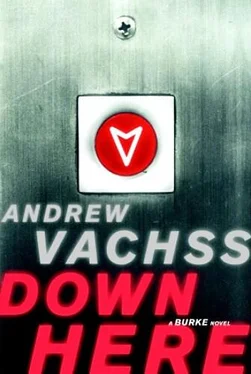Max spread his hands, put a “What the hell did I do?” expression on his face.
“You know how cook? Make food?” Mama asked, miming the question as she spoke.
Max made a stirring motion with his fist.
“What you make?” Mama demanded.
Max sipped from an imaginary spoon.
“Soup? You make soup?”
Max grinned, gesturing a man opening a can, pouring into a pot, turning on a stove, stirring.
“That not make soup. In kitchen, here, make soup. Where you get soup?”
Max gestured his way into a grocery store.
“So! You not make soup, you buy soup, right?”
Max nodded, glumly.
“What you get soup with? Money. How you get money? Work. Not play games, work. Okay?”
Max and I decided we’d start a little early that evening.
Now I waited for the soup to warm up on my hotplate. It had come from a container I keep in the refrigerator. Mama’s soup, sure. But at least it wasn’t from a can.
The “message center” is a basement poolroom, in a building no reputation could be low enough to live up to. Inside, it’s like the Fifties never went away. They’ve got a few top-shelf tables—all heavy, carved wood, with green felt and leather pockets. Lights suspended from the ceiling on long chains hang over the tables; overhead wires are strung with beads, for scorekeeping. It’s no Julian’s, but not even Julian’s is, anymore.
The guy who runs the joint has been an old man since I was a kid. Rumor has it that he was a pro once, but nobody’s ever seen him pick up a stick. He keeps the tables beautifully maintained—tight, grippy cloth, fresh rails, and dead level. But that’s strictly a labor of love; people who come to his basement mostly don’t give a damn.
The old man is a human telegraph machine. You drop your money in the slot, you send a message. Someone wants to reach out for you, they do the same.
There are other services, too. I have my own cue, a custom job. It was built back before they used special breaking cues for nine-ball. Weighed in at a svelte thirty-two ounces even before I wrapped the butt end in several layers of friction tape. Like all of the good ones, it unscrews in the middle.
But mine has another feature, a little compartment in the fat end. If you know which cue is mine, you come in and ask the old man to rent number thirteen, and he hands it to you . . . after you put up a thousand-dollar deposit.
When you’re done playing with my cue, you bring it back. The old man gives you nine hundred and fifty bucks, and removes your message. And whenever I drift down to the basement, I can read whatever you paid the half-century to write down for me . . . after I pay the old man the storage fee that’s always past due.
The system is no good for emergencies, and everyone knows it. Even telling the old man direct is only going to work if I call in. He won’t make calls, not for any kind of money. Not to anybody, which is why he’s been in business so long.
The poolroom may have regulars—I don’t go there enough to know—but it’s not Cheers. Greeting anyone coming in by name would be a mistake, one the old man never makes.
I got there around ten, ransomed my cue, and pointed at one of the two tables that are set at opposite ends of the basement, each in a separate corner. I walked over, took the triangular RESERVED sign off the felt, and started knocking the balls around, getting the feel.
If I’d taken any table but one of the two corner ones, sooner or later someone would have drifted over, asked me if I wanted to play something for something. But everyone knew what the corner tables were for. You rent those, too.
It only took a few minutes for me to realize that it wasn’t just a case of me being rusty—I wasn’t the same, and I never would be. My eyes aren’t just two different colors now—they don’t work as a team anymore. When you lose binocular vision, you lose depth perception, too. Not such a big deal driving a car—which is why they’ll give a one-eyed man a license—but you’ll never get work threading needles.
I tell myself that I’m a man who doesn’t mourn his losses, just cherishes his memories. Sometimes, that’s the truth. And sometimes, when I think of Pansy, or of Belle, it’s a lie.
If you believe only a crazy man would miss a dog and a woman with equal pain, you don’t know what love-driven loyalty means to our tribe. Or what we’ll do for it. Do to you, if you get in its way.
I couldn’t ever hope to find the cops who shot Belle. Anyway, that hadn’t been personal. She had drawn their fire on purpose, to keep them off me, out-driving the whole pack of them, heading for the junkyard. She won that race, but it was her last one. I found her, riddled, hanging on until I could get there and tell her I loved her. The only time I ever did.
Belle’s mother was her sister. She had sent Belle running when her father put Belle next on his list. Belle was still running when I met her. A pro getaway driver, as good behind the wheel as any I had ever known. When she put her heart in my hands, she put her trust in me, too.
After she left me, what I had to do was written as clear and clean as her love had been. I found her father, and I killed him.
Years later, people who’d been paid to cancel my ticket set up an ambush. They sprung their trap on me, never expecting a hellhound to come charging out of the trunk of my car. By the time Pansy had ripped out the throat of one of them, they were shooting in self-defense.
As soon as I escaped from the hospital, I went looking for them. That took a lot longer, because I didn’t know who they were. But I found them. When I did, the pain didn’t stop. But it changed.
I’ll never truly know if I’d done all that for them, or for me. Not for sure. What I did know is, they wouldn’t have cared.
You’re here now, I said in my mind. Get what you came for.
I didn’t concentrate on pocketing balls, only worked the white one, focusing on my stroke. I was just starting to feel okay about my draw when Molly Sands came downstairs.
It only took a second for his cop’s eyes to pick me out. It took less than that for everyone else there to make him for what he was.
“A little nine-ball?” I asked him.
“Eight-ball’s my game,” he said. “And I’m used to smaller tables.”
Bar tables, I thought, keeping it off my face. “Sure,” I said. “I’ll rack them, you break.”
Sands was an appalling player. He managed to pocket a solid, then muffed an easy shot on the three ball.
“What’s new?” I asked him, as I chalked up.
“The techs got a good look at the slugs.”
“And?”
“They can’t tell for sure, without a barrel to match them to, but the guy they have in charge says he’d bet a year’s pay it didn’t come from any cheap piece. He says you can always tell the workmanship, and whatever the shooter was using was quality.”
“Doesn’t mean much,” I said, pocketing the ten in the corner, then deliberately blowing a shot on the fifteen.
“Well, a gangbanger might use a cheap-ass twenty-five—in some neighborhoods, they sell them like hot dogs. But a baby caliber in a good gun, that’s something a pro might use.”
“A twenty-two, sure,” I agreed. “They hit hard enough, if you place them perfect. But a twenty-five? Never heard of it.”
“I did,” Sands said. “After I checked around, I heard of something even smaller, too. Beretta used to make a twenty-two short. Smaller than a twenty-five. The whole piece, I mean, not just the bullet. Fucking tiny. The gun guy I spoke with even said it was called an ‘assassin’s special.’ Mossad used to use it, all the time.”
Читать дальше











